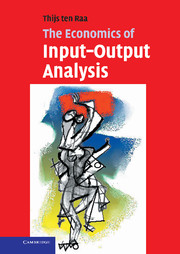Book contents
- Frontmatter
- Contents
- List of figures
- List of tables
- Preface
- Glossary
- 1 Introduction
- 2 Input-output basics
- 3 Multiplier effects
- 4 Linear programming
- 5 Are input-output coefficients fixed?
- 6 The System of National Accounts
- 7 The construction of technical coefficients
- 8 From input-output coefficients to the Cobb–Douglas function
- 9 The diagnosis of inefficiency
- 10 Input-output analysis of international trade
- 11 Environmental input-output economics
- 12 Productivity growth and spillovers
- 13 The dynamic inverse
- 14 Stochastic input-output analysis
- Solutions to exercises
- Index
- References
1 - Introduction
Published online by Cambridge University Press: 18 December 2009
- Frontmatter
- Contents
- List of figures
- List of tables
- Preface
- Glossary
- 1 Introduction
- 2 Input-output basics
- 3 Multiplier effects
- 4 Linear programming
- 5 Are input-output coefficients fixed?
- 6 The System of National Accounts
- 7 The construction of technical coefficients
- 8 From input-output coefficients to the Cobb–Douglas function
- 9 The diagnosis of inefficiency
- 10 Input-output analysis of international trade
- 11 Environmental input-output economics
- 12 Productivity growth and spillovers
- 13 The dynamic inverse
- 14 Stochastic input-output analysis
- Solutions to exercises
- Index
- References
Summary
The definition of economics
In An Essay on the Nature and Significance of Economic Science (1984) Lionel Robbins (1898–1984) defines economics as “the science which studies human behavior as a relationship between given ends and scarce means which have alternative uses.” This famous “all-encompassing” definition of economics is still used to define the subject today, according to The Concise Encyclopedia of Economics (http://www.econlib.org/library/CEE.html). The underlying idea is that absent scarcity, all needs could be satisfied, no choices would have to be made, and, therefore, no economic problem would be present. But which resources are scarce? Is air scarce? If not, maybe clean air is scarce? If we stick to the traditional definition of economics, these questions must be answered prior to any economic analysis: in some mysterious way, all the scarce resources are known. In my opinion, however, the enumeration of scarce resources should be included in the definition of economics. I therefore modify Robbins' definition by omitting the adjective “scarce.” In short, I define economics as the study of the allocation of resources among alternative ends – or, more precisely, the study of the allocation of resources to production units for commodities and the distribution of the latter to the population. Some resources may be scarce, others may not be. Scarcity will be signaled by a price. If resources are not scarce, they will have a zero price.
- Type
- Chapter
- Information
- The Economics of Input-Output Analysis , pp. 1 - 13Publisher: Cambridge University PressPrint publication year: 2006



